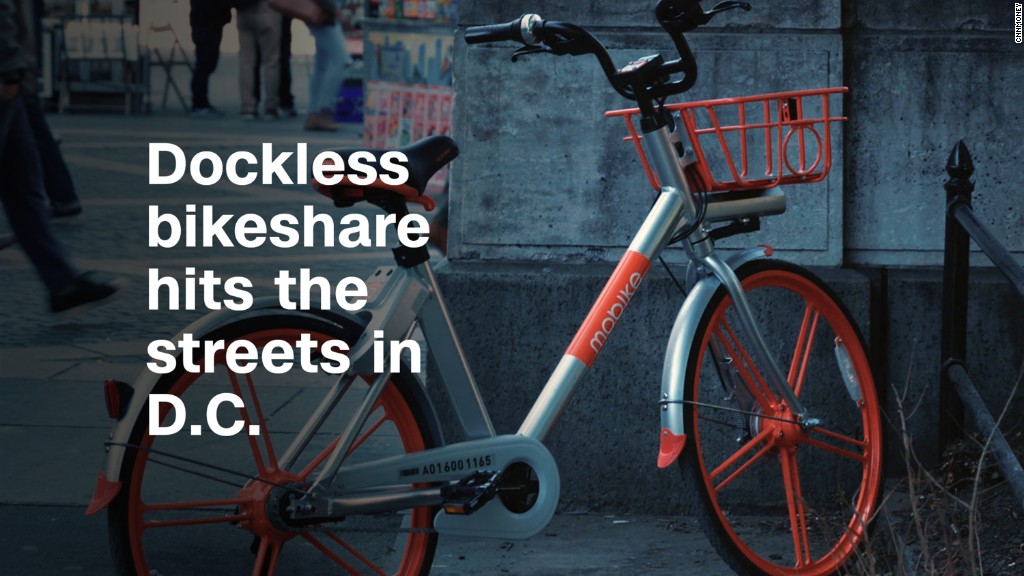
The future of ride-sharing is moving beyond cars to include electric scooters, bikes, and even public transit as Uber and Lyft race headlong into "new modalities."
That's a fancy way of saying the two companies want a role in all of the ways you get from point A to point B. Ultimately, they don't really care how you get around, so long as you're doing it on their platform.
Two recent moves underscore just how serious they are about this. On Monday, Lyft announced its acquisition of Motivate, the largest bike-share operator in North America. That followed news that Uber is launching a "new modalities" unit to lead its expansion into bikes, scooters, and more.
"There's no doubt both companies want to become full spectrum transportation providers," said Junfeng Jiao, an assistant professor of community and regional planning at University of Texas at Austin.
Uber, which, at a valuation of around $62 billion is worth about four times as much as Lyft, leads the race so far.
In April, it snapped up Jump, a bike-sharing service that operates in 40 cities. The company also has brokered deals with the peer-to-peer car sharing startup Getaround and with Masabi, which does mobile ticketing for public transit. It's all part of CEO Dara Khosrowshahi's plan to make Uber your go-to transportation service.
The job of making that happen falls to Rachel Holt, who will lead the modalities unit. She made her name at leading Uber's US and Canadian operations. When she joined nearly seven years ago, Uber operated in just three markets. That number now stands at 630 worldwide. Khosrowshahi wants her to apply the same expansion strategies to these new ventures, starting with bike sharing.
Holt told CNNMoney that Uber has "aggressive plans" to expand Jump's business. Aggressive is a loaded word for Uber, however, because the company's rapid expansion under founder and former CEO Travis Kalanick often saw it butting heads with regulators and municipal leaders. Khosrowshahi has taken a more tactful approach since taking over in August.
Related: Lyft acquires Citi Bike parent company, Motivate
Holt said she hasn't mapped out any benchmarks for growth, and says she believes cities will find Uber's embrace of other transportation options attractive.
"The more we can have a holistic solution to a city's needs, the better," she said. "In many cases, we now have very, very strong relationships with cities. Having multiple options aside from just cars will continue to make those relationships even closer."
Uber, like Lyft, also sees e-scooters playing a big role in urban transport. The company has applied for one of five permits San Francisco (the epicenter of the e-scooter craze) will issue, but Holt says it is too early to say whether Uber will develop its own scooters or make a strategic acquisition to get in the game.
The rapid infusion of cash into e-scooter startups all but requires Uber and Lyft to move into the space. Bird raised $400 million in four months and is now valued at $2 billion. Lime, another big player, hopes to raise another $300 million at valuation north of $1 billion, according to new paperwork filed in Delaware Tuesday.
Related: Uber buys a bikeshare company as it looks to expand beyond cars
Uber and Lyft watched those companies hit billion-dollar valuations far faster than they did, "so they're paying attention," said Daniel Sperling, the founding director of the UC-Davis Institute of Transportation Studies and author of "Three Revolutions."
Sperling said exploring new modes of transportation is "well aligned" with public interests and the companies' own long-term goals. "It's part of playing a bigger role in a 'passenger-on-demand' service space," he said.
E-scooters and bikes may seem like niche markets, but they help Uber and Lyft solve the so-called "last mile" problem, said Erick Guerra, a University of Pennsylvania professor and expert on urban planning.
The last mile refers to helping people get from, say, a subway station or carpooling location to their final destination. Scooters and bikes are great ways of doing that, said Jonathan Levine, a University of Michigan professor of urban and regional planning. "Policymakers should welcome the entry of big players into that market," he said.
Of course, all of this depends upon Uber and Lyft playing nicely with regulators, city officials, and city residents -- many of who express disdain for the high-tech scooters and bikes already littering their streets. Any efforts to expand into new forms of transportation will need to be in tandem with conversations about safety, public access, and working with the communities that will be affected, Levine said.
Assuming those conversations go well, you may one day soon ride a scooter to a train in the morning and hail a car home in the evening -- all within the same app.

